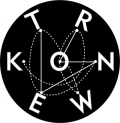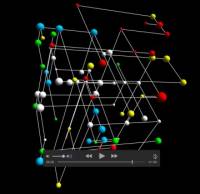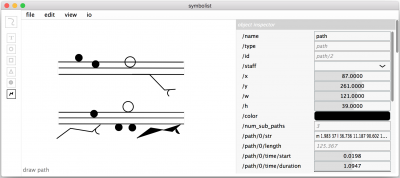Groupe de travail IRCAM - Notation
Le groupe de travail Ircam-Notation a pour but de susciter une reflexion autour des problématiques de la notation dans le contexte contemporain de production musicale liée à la technologie.
Il fait suite et s'insère dans la dynamique de plusieurs initiatives, nationales ou internationales, auxquelles l'IRCAM a été associé depuis 2013:
- Groupe de travail "Les nouveaux espaces de la notation musicale", supporté par l'AFIM (2013-2015).
- Co-organisation de la première conférence internationale sur les technologies pour la notation et la représentation dela musique (TENOR), Sorbonne Université / IRCAM, 2015.
- Pilotage de la conférence TENOR.
- TENOR Network: Partnership Development Grant, Canadian Social Sciences and Humanities Research Council (2018-2021).
Coordination: Jean Bresson
Agenda
• 19/03/2018: Réunion #1: Kick-off
14h-16h, IRCAM
• 03/05/2018: Réunion #2: Formats pour la notation
14h-15h30, IRCAM
- Robert Piéchaud: Présentation et discussion sur le format MNX proposé par le W3C Music Notation Community Group.
(W3C MN group meeting @Musikmesse'18 - Frankfurt)
• 13/06/2018: Réunion #3: Roadmap
14h-15h30, IRCAM
- Bilan et information: TENOR 2018 / SSHRC Partnership Development Grant consortium TENOR
• 12/07/2018: Réunion #4: Temps et notation
14h-16h, IRCAM
- Dominique Fober: Extensions temporelles dans INScore
- Jean-Louis Giavitto: Notions temporelles et leur notation dans le DSL Antescofo
• 05/11/2018: Réunion #5: Notation sur le web
14h-16h, IRCAM, studio 5 (session commune avec la journée RIM-Recherche)
- Jonathan Bell: SmartVox – Notation Audiovisuelle distribuée dans le navigateur web.
Développé par Benjamin Matuszewski dans l'environnement SoundWorks (ISMM/CoSiMa), SmartVox utilise un serveur node.js pour distribuer et synchroniser des partitions sur les smartphones des interprètes, pour des productions chorales et instrumentales (jusqu'à 90 connections simultanées). Node.js intéresse actuellement plusieurs compositeurs (Cat Hope / Decibel ScorePlayer, Georg Hajdu / MaxScore), ce qui laisse présager de nombreux développements dans le domaine des partions distribuées.
Séminaires
David Kim-Boyle — Generative Notation
26/01/2018 — Séminaire Recherche & Création IRCAM
David Kim-Boyle (visiting composer/researcher) from the University of Sydney (Australia) presented his work on real-time, generative notations with numerous examples from recent collaborations with Australian new music ensemble Decibel, Dutch sound-poet Jaap Blonk, and the Hamburg based TonArt Ensemble. The unique musical possibilities afforded by generative notation will be discussed and he will conclude the talk with discussion of the development of a new work for the ELISION ensemble, which is the focus of his research at IRCAM, featuring the use of responsive, three-dimensional notational schemas.
Rama Gottfried — Symbolist: an open graphic notation environment for music and multimedia
7/03/2018 — Ateliers du Forum IRCAM / End of artistic research residency
During the IRCAM Forum workshops 2018, Rama Gottfried introduced Symbolist, a graphic notation environment for music and multimedia, developed with Jean Bresson (IRCAM) as part of his 2017-18 IRCAM-ZKM Musical Research Residency. Symbolist was designed to be flexible in purpose and function, capable of controlling computer rendering process such as spatial movement, and an open workspace for developing symbolic representations for performance with new gestural interfaces. The system is based on an Open Sound Control (OSC) encoding of symbols representing multi-rate and multidimensional control data, which can be streamed as control messages to audio processing, or any kind of media rendering system that speaks OSC. Symbols can be designed and composed graphically, and brought in relationship with other symbols. The environment provides tools for creating symbol groups and stave references, by which symbols maybe timed and used to constitute a structured and executable multimedia score.
⇒ Symbolist projet page on GitHub


